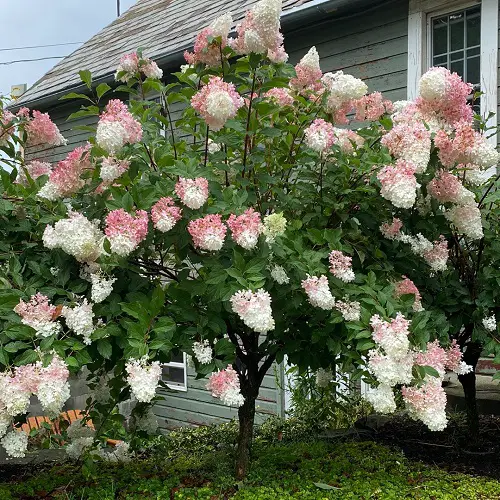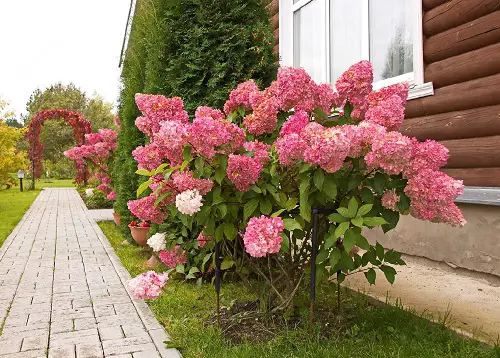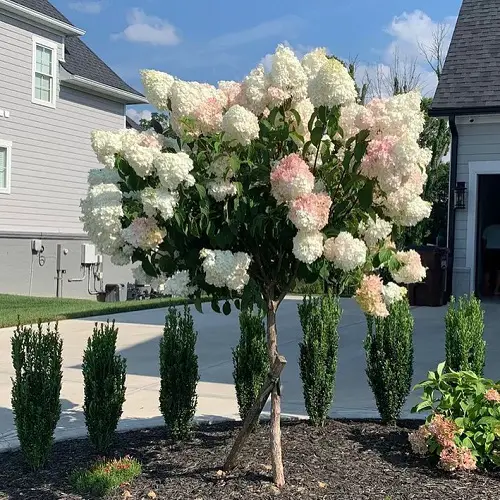Want to Grow a Hydrangea Tree? Is it even possible? From planting to pruning, learn everything in this detailed guide.
Hydrangeas are great garden plants, thanks to their bunch of blooms that come in a variety of shades. However, if you are someone who wants to train these plants to become tall, then keep on reading to learn How to Grow a Hydrangea Tree!
Check out the Most Beautiful Types of Hydrangeas
What is a Hydrangea Tree?
The Hydrangea tree is nothing but a hydrangea that was trained to grow taller, making it look like a small tree. There is no such thing as a ‘Hydrangea Tree’ that you can purchase and grow directly in your garden, but you can definitely train this shrub to make it look like a tree.
How to Grow Hydrangea Tree?
1. Choose the Right Variety
As we all know, hydrangeas are small little shrubs that grow no taller than 2-4 feet generally. However, there are certain varieties that can achieve impressive heights, and if you can train them, these plants can be easily made to look like small trees!
Here are some of the best hydrangeas that you can train as trees:
- Quick Fire: 6-8 feet tall
- Tardiva: 8-12 feet tall
- Pinky winky: 6-8 feet tall
- Little Lime: 4-6 feet tall
- Vanilla Strawberry: 7-10 feet tall
- Pee Gee: 10-20 feet tall
- Oakleaf: 4-6 feet tall
- Limelight: 6-8 feet tall
- Snowball: 3-5 feet tall
2. Make Sure They Get the Right Amount of Sunlight
Sun is as important for plants as food for us. If these plants don’t get proper light, then they won’t grow tall and strong.
If you are planning to grow hydrangeas as trees, then it is important to choose a location that gets a direct morning sun for 5-6 hours and a dappled bright light for the rest of the day. This will ensure the plant gets proper light, which is essential for it to grow tall.
3. Pruning is REALLY Important!
Hydrangeas are shrubs that you can prune and train to grow in a tree-like shape. Also, it is best to start young with a plant that doesn’t have a thick main stem.
- To achieve a tree-like shape, prune away all shoots from the base of the shrub and leave one long “trunk.”
- If you prefer a round, tree-shaped crown, trim the branches closer to the main trunk while leaving some branches at the top.
- For a beautiful and trimmed ‘head,’ it is important that you prune the tree religiously once a year. To learn everything about the best pruning time and technique–click here.
Learn How to Change Hydrangea to the Color You Want
4. Support at the Early Stages of Growth
As the hydrangea grows taller, it may need additional support to prevent it from bending or breaking. Use a stake or a trellis to provide support from the beginning, making sure to tie the hydrangea securely to the support structure.
Position the support closer to the main trunk/stem of the plant and secure it using twine. Make sure that you are not making a tight knot. Also, the supporting pole/stick should go at least 4-6 inches in the ground, away from the plant roots, for secure support.
The support will keep the plant safe from strong winds, too. Keep the support on till the plant develops a thicker and stronger main stem.
5. Feed to Boost the Growth
To boost the growth, use a balanced liquid fertlizer, diluted to 1/4 of its strength, and apply it in the growing medium once in 15 days.
The trick here is to use a low strength and fertilize more frequently in order to help the plant grow tall.
You can also feed it using a slow-release fertilizer, once in early or mid-spring and again in mid-summer, to promote healthy growth and flowering.





